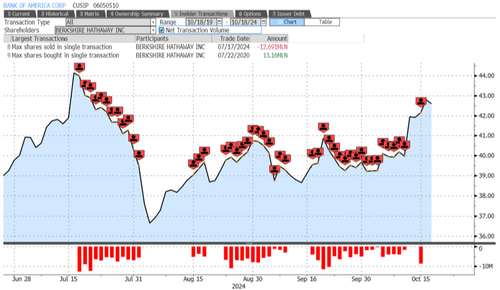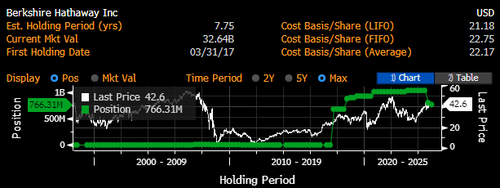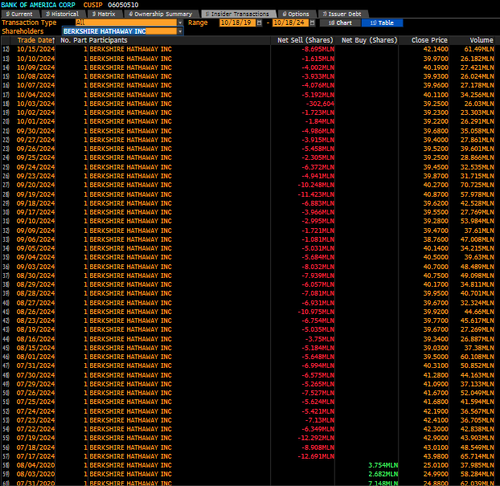94-year-old Warren Buffett's Berkshire Hathaway offloaded even more Bank of America shares this week to sustain <10% regulatory threshold, a move triggered by the bank's own share buybacks, which pushed Berkshire's stake back above the 10% mark. Buffett's strategy is clear: keep the stake below this threshold to avoid constant SEC reporting that results with every sale.
Bloomberg data shows Berkshire's total proceeds from selling BofA shares topped $370 million this week. The selling abruptly began in mid-July.
Berkshire's stake is now under 10%, currently at 9.88%, which means that instead of disclosing trades every few days, this can now be done quarterly. The valuation of the position stands at around $32.64 billion (as of Thursday's close).
Bloomberg explained how a recent multi-billion share buyback purchase by BofA pushed Berkshire back over the 10% mark:
Buffett's earlier rounds of selling had already cut the holding to less than 10% of the Bank of America shares known to be in circulation before the lender announced on Tuesday that it had repurchased $3.5 billion of stock during the third quarter. The bank's updated figure meant Berkshire was back above that key regulatory threshold.
The latest selling is the first round of Berkshire selling BofA shares since right before the pandemic.
Buffett remains the top BofA shareholder.
On Tuesday, Bank of America released its third-quarter earnings, revealing a cycle-low in net interest income while charge-offs and credit losses surged to their highest levels in years.
Neither Buffett nor Berkshire have made any public statements regarding their months-long selling of BofA shares.
Why Buffett is dumping BofA: provision for credit losses highest since covid lockdown pic.twitter.com/qt8pcAivgc
— zerohedge (@zerohedge) October 15, 2024
However, following this earnings report, one can only speculate on the reasons behind the sudden unloading.
94-year-old Warren Buffett's Berkshire Hathaway offloaded even more Bank of America shares this week to sustain <10% regulatory threshold, a move triggered by the bank's own share buybacks, which pushed Berkshire's stake back above the 10% mark. Buffett's strategy is clear: keep the stake below this threshold to avoid constant SEC reporting that results with every sale.
Bloomberg data shows Berkshire's total proceeds from selling BofA shares topped $370 million this week. The selling abruptly began in mid-July.
Berkshire's stake is now under 10%, currently at 9.88%, which means that instead of disclosing trades every few days, this can now be done quarterly. The valuation of the position stands at around $32.64 billion (as of Thursday's close).
Bloomberg explained how a recent multi-billion share buyback purchase by BofA pushed Berkshire back over the 10% mark:
Buffett's earlier rounds of selling had already cut the holding to less than 10% of the Bank of America shares known to be in circulation before the lender announced on Tuesday that it had repurchased $3.5 billion of stock during the third quarter. The bank's updated figure meant Berkshire was back above that key regulatory threshold.
The latest selling is the first round of Berkshire selling BofA shares since right before the pandemic.
Buffett remains the top BofA shareholder.
On Tuesday, Bank of America released its third-quarter earnings, revealing a cycle-low in net interest income while charge-offs and credit losses surged to their highest levels in years.
Neither Buffett nor Berkshire have made any public statements regarding their months-long selling of BofA shares.
Why Buffett is dumping BofA: provision for credit losses highest since covid lockdown pic.twitter.com/qt8pcAivgc
— zerohedge (@zerohedge) October 15, 2024
However, following this earnings report, one can only speculate on the reasons behind the sudden unloading.




